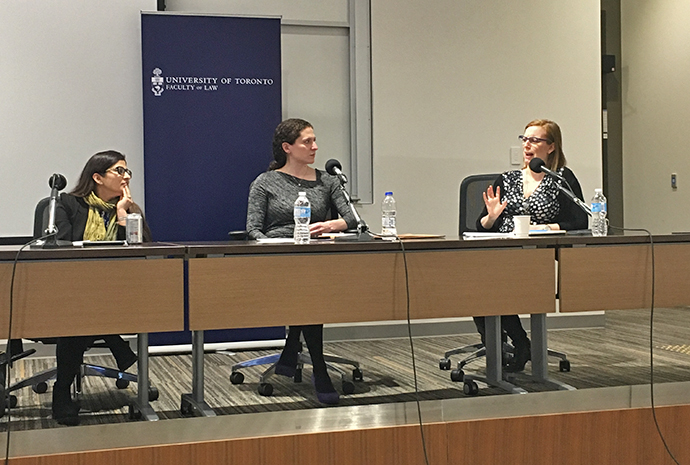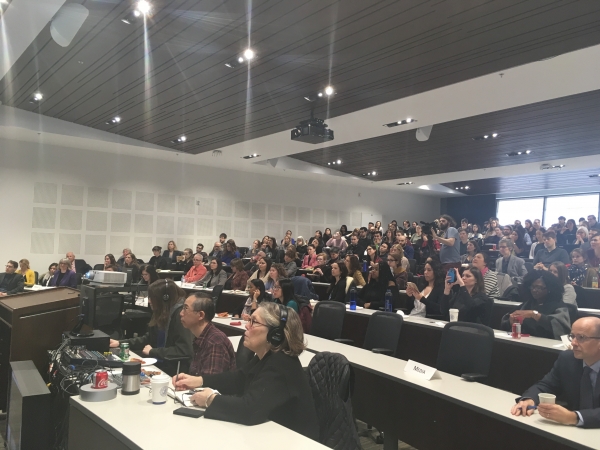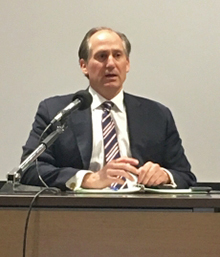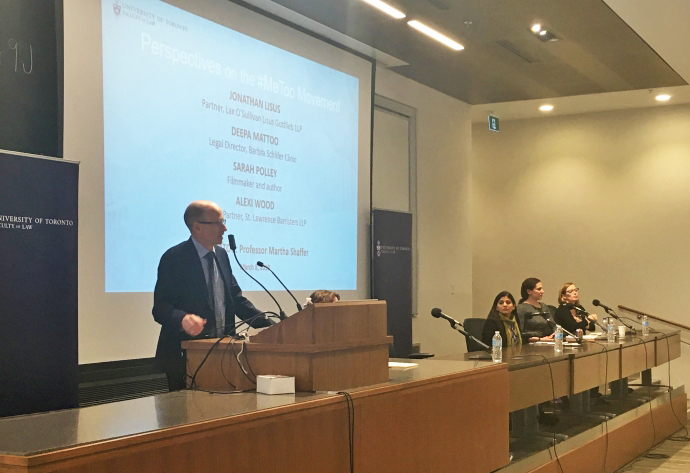 Deepa Mattoo, legal director at the Barbra Schlifer Clinic, lawyer Alexi Wood, filmmaker Sarah Polley
Deepa Mattoo, legal director at the Barbra Schlifer Clinic, lawyer Alexi Wood, filmmaker Sarah Polley
By Lucianna Ciccocioppo / Photos by Wasila Baset and Lucianna Ciccocioppo
The #MeToo movement is having a seismic impact in the online and offline worlds for victims of sexual abuse and harassment, and their abusers, raising a whole host of questions about women’s rights, due process, options available to plaintiffs, and the very real fear of defamation claims.
These were some of the issues discussed at the Faculty of Law’s “Perspectives on the #MeToo Movement,” on International Women’s Day, March 8th. More than 210 people attended—along with another 45 who watched the live broadcast on Facebook—to hear the panel: lawyers, Deepa Mattoo, Alexi Wood, Jonathan Lisus and filmmaker Sarah Polley. Professor Martha Shaffer moderated the panel, which took place in a packed Moot Court Room, after an introduction by Dean Ed Iacobucci.
Shaffer started by reminding everyone the hashtag #MeToo was launched in 2006 by African-American Tarana Burke, and has only recently has gone viral.

More than 210 people attended the panel discussion, while an additional 45 people watched the live broadcast on Facebook.
“The Me Too movement didn't start in a vacuum, and I think that's one of the things that's important to address,” said Alexi Wood, a founding partner at St. Lawrence Barristers, and counsel for the plaintiffs in the Soulpepper Theatre litigation. “What we've been accepting is the status quo is not okay for a variety of reasons, and this happened in a bunch of different contexts. We saw -- and this is not an exhaustive list by any stretch -- but there was the Black Lives Matter movement, there's been a lot more discussion about mental health, about transgender issues, about aboriginal issues. All of these discussions were coming forward.”
Nobody was going to take Harvey Weinstein to court. You would have been crazy. From my perspective, as someone outside the legal profession, this specter of being on a stand in a criminal trial, accusing someone of sexual assault, is not a pretty one.”
--Filmmaker Sarah Polley
Deepa Matto, legal director at the Barbra Schlifer Clinic, added that hearing these disclosures and how pervasive violence against women is nothing new for the clinic.
“The clinic is named after a woman who was sexually assaulted and killed on the night of her call to the bar, and the people from the legal fraternity here in the room, we can take a moment to reflect on that. This clinic in itself exists out of a very sad situation of violence against women and sexual assault, so it's definitely not new…. when we talk about violence against women, in the context of a digital movement like Me Too, whose stories are being told, whose stories get told, who can access that resource to tell those stories? I think all of those factors need to be kept in mind when we're talking about this.”
Filmmaker Sarah Polley, author of a recent oped in the New York Times on #MeToo, said there’s a “mainstream re-evaluation” going on, of women’s past experiences, a reframing of what is acceptable.
“I think it's a really important part of the conversation to hear men reflecting on how they behaved in the past, and looking at their behaviour instead of this being a completely female-centric movement. I think it's about us all looking also at our complicity. I think that there's also a lot of necessary finger-pointing going on, but we also have to look at ourselves. This kind of normalized behaviour existed because a lot of us, and I include myself in this, while we were experiencing sexual harassment in the film industry specifically, we were also standing by and watching it happen almost every day. And there didn't feel like there was a recourse.”

Jonathan Lisus
Jonathan Lisus, partner at Lax O’Sullivan Lisus Gottlieb, and until recently counsel to Ontario PC politician Patrick Brown in his claim against CTV, took the movement back to the rise of the Arab Spring, and the ability of digital and social media to challenge power dynamics. “All of a sudden, the citizenry have real power because you've got a camera and you've got a camera that you can project out to millions of people. You don't have to persuade a news outlet to run it for you.”
Lisus explained how he’s watched the movement grow— “a very fascinating and in some ways wrenching learning experience”—through the lens of various perspectives. “One of them is the perspective of a father of a second-year female law student at this school, who is about to go into the practice of law, which is an environment that has power structures and authority structures.”
Prof. Shaffer asked why the movement was playing out for the most part in the media, rather than the legal system, Polley said: “Nobody was going to take Harvey Weinstein to court. You would have been crazy. From my perspective, as someone outside the legal profession, this specter of being on a stand in a criminal trial, accusing someone of sexual assault, is not a pretty one.”
Looking straight into the audience and acknowledging the largely legal and law student crowd, Polley went on to describe conversations she’s had with defense lawyers she knows.
“I've asked a lot of criminal defense lawyers this question: Would you advise someone you loved to come forward in that kind of case? And almost 100 per cent of the time the answer is no. And almost 100 per cent of the time when I asked the question: Should anything be changed within either the system itself or the behaviour of the actors in the system, to make this easier on complainants, the answer is also no. And when prodded about that contradiction, I get extremely emotional responses from people who are trained to be rational.”
Polley raised concerns about “vigilante justice” and argued for due process, but added it was understandable why victims chose speak out on social media.

Dean Edward Iacobucci opens the workshop, "Perspectives on the #MeToo Movement"
“I think it's a matter of being smart. You look at how you can be savaged on a stand, and then you look at the media which is yes, unreliable, and yes, self-serving, but a lot less scary. And none of this would have been happening without the media.” She lauded the New York Times series that broke these stories and praised the efforts that went into due diligence and responsible journalism.
Lisus stressed the question of due process is critically important, albeit difficult as well “because due process means different things in different contexts.”
He added: “We have, for better or for worse, an adversarial system of justice. And that is true of the civil system, and the criminal system. And I believe as a practitioner in those systems, although they are imperfect and they have many shortcomings, they are fundamentally sound for the job they have to do.”
Lisus argued there is definitely room for improvement in the legal system, but then turned the question of due process onto the audience: “Think about one of your loved ones facing a serious criminal charge—your wife or your brother or your husband, or your father. How much due process do you want them to have? A lot, I bet. Think about yourself being charged, or being on the receiving end of a lawsuit. How much due process do you want? I bet a lot.”
Panellists also drew a distinction between traditional and social media, and their roles in empowering people to come forward.
“Definitely there is a power in telling your story and telling your experience in the way you want to tell it, rather than someone telling you this is all that you can talk about, and boxing you in,” said Mattoo, “you can only talk to me about this, this incident this way, and this is how you tell your story. You are actually controlling that process if you choose to tell that story in your own words, when you want to tell it, how you want to tell it. If all of that is under your control, then you do feel that you are able to tell that story the way you wanted to tell it. Most definitely, there is risk, but then in what process do we not have risk?”
She then went on to raise concerns about understanding the impact of telling your stories online. “My only thing is having avenues for women to make those choices clearly: If I engage with the legal system tomorrow, what does this tweet mean right now for me? What does telling a story on a blog mean to me?”
Still the movement has changed workplace behaviours, said Mattoo, who brought up a Plan International study on the first anniversary of viral #MeToo movement. Out of 3,000 respondents, 65% said there was a positive impact in the workplace, and 68% said it appeared men's workplace behaviour had changed.
Wood went further to explain there are other options for women to regain power.
“It's not a sort of binary [route]: Am I going to go to the police and so through the criminal justice system or not? And I think we are happily moving away from that discussion of ‘Well, but you didn't go to the police did you?’ There's this sort of implicit assumption in that, if you didn't go to the police or if a woman chose not to go to the police, that somehow her claim isn't real. She may choose to not go to the police for a variety of reasons that has nothing to do with the strength or merits of the case; it's just a choice. And again it's that choice, that power, that control, that's so important. So when looking at this issue, there are many different options that exist: there's media alone, there is the criminal justice system, and there is civil litigation. If it's an internal issue with an employment issue, you can internally deal with it through HR policies.”
Shaffer brought up the fact the Me Too movement has it critics, with concerns about due process, the courts of public opinion impacting careers, and rising backlash.
Polley said while her initial reactions seemed “knee-jerk” and she worried that the slew of firings had the movement “going off the rails,” she started looking deeper into the stories and found the investigations had been going on for months.
“I'm actually concerned about [defamation],” explained Polley. “I'm concerned about this for my friends and for my colleagues. They're doing a lot of really heroic information-sharing right now that is designed to keep women safe, some of which has very practically kept other women safe from situations they were about to walk into…It's happening in a lot of social media, but it's also happening in a lot of, quote unquote, private social media, where people feel like they're sharing only with each other, and in fact I know of cases where the people being accused are actually watching these feeds.”
Mattoo agreed the risks for defamation “are definitely there,” and women need to receive proper legal advice but stressed “if she's speaking truth, then she doesn't need to be fearful of defamation, right? So we need to remember that.”

 Deepa Mattoo, legal director at the Barbra Schlifer Clinic, lawyer Alexi Wood, filmmaker Sarah Polley
Deepa Mattoo, legal director at the Barbra Schlifer Clinic, lawyer Alexi Wood, filmmaker Sarah Polley

